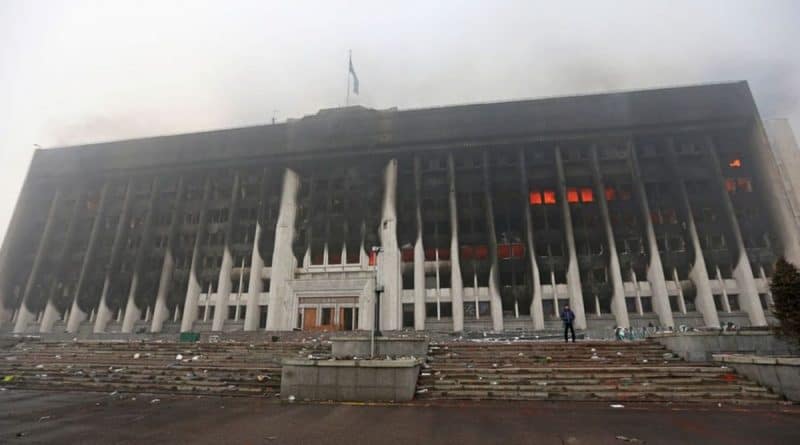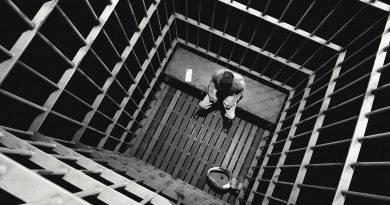Kazakhstan: National Security Committee obstructs investigation into January events
Human rights activist Ayman Umarova appealed to the President of Kazakhstan, Kassym-Jomart Tokayev, with a request to exclude employees of the National Security Committee from the interdepartmental investigative-operational group investigating the events of bloody January in Kazakhstan. She also asked that the cases pending in the NSC be withdrawn and transferred to another body, since the NSC’s officers obstruct the investigation.
In the first ten days of January, rallies were held in all big cities of Kazakhstan against the increase in gas prices. Then they turned into riots in some regions, including Almaty. Thus, according to the Prosecutor General’s Office, about 30,000 people took part in the riots in Almaty. According to the latest data, 230 people died during the riots. The Prosecutor General’s Office is handling 3,660 criminal cases against the participants in these events. 62 people have already been sentenced to various terms. On the facts of torture and abuse of power, the Prosecutor General’s Office is conducting 243 pre-trial investigations. In total, over 3,000 weapons were stolen during the riots. Law enforcement agencies managed to find only a third of the stolen weapons. The damage from the January mess throughout the country amounted to about $200 million.
‘About 3,500 law enforcement officers received various injuries during the riots, but even then no force was used against the protesters,’ Prosecutor General Berik Asylov said in the Parliament of Kazakhstan. ‘To the bitter end, they used non-lethal special means: light-noise grenades, rubber bullets, but it was perceived as a weakness. The crowd attacked the police and soldiers, using firearms and improvised means. The ultimate goal of these riots was the violent seizure of power. To stop this terrorism, law enforcement officers were forced to use weapons. Irreversible consequences could be – right up to the loss of statehood.’
According to the Prosecutor General, the January events consisted of several waves. The first wave were peaceful protesters who didn’t have any clashes with the police. On the contrary, Asylov emphasized that the authorities provided people with every opportunity to hold a peaceful rally. However, then provocateurs began to appear among the protesters, who began to come into conflict with the police. It was the second wave. Then criminal elements joined the protesters; it was the third wave. With their appearance, pogroms and arson began, which was used by the fourth wave – the radicals, who organized targeted attacks on law enforcement and government facilities.
“All actions were coordinated. It was a well-planned action,” said the Prosecutor General.
He also said that after the January events, the Prosecutor’s Office received 301 complaints about unlawful methods of investigation.
“243 criminal cases were initiated on torture and abuse of power. 234 criminal cases were initiated by the Anti-Corruption Agency. This is its direct investigative jurisdiction under the Code of Criminal Procedure. The nine most high-profile cases, and where the detainees died in pre-trial detention centers, are being investigated by special prosecutors. In the framework of these cases, 9 officials were detained, including 8 employees of the National Security Committee and 1 policeman. All of them are arrested. Among them are those who are suspected of using an iron in the police station of Almaty region. In Almaty, six police officers are suspected of using torture on 24 detained citizens. As a result, all the victims were injured, and one person died. Two more employees of the NSC’s Department for Almaty region are suspected of beating a previously detained person in a temporary detention facility, from which he died. The investigation is ongoing,” the Prosecutor General said.
In his speech to the deputies, the Chief Prosecutor of the republic also spoke about the victims of the January tragedy.
“230 people died, among them were 19 military and security officials. Most of them, 139 people died in Almaty. It was found that 86 attackers were eliminated when repulsing the assault on administrative buildings. According to 53 dead, the circumstances of death are being clarified. They were found on the territory of the city with various injuries: 48 – with gunshot wounds, 2 – with knife wounds, 3 – with other injuries and burns. Today we know for sure about the death of 20 civilians who accidentally came under fire. Of these, 11 were in Almaty, 8 in Almaty region and 1 in the city of Taraz. Among them were those who fell under the crossfire. There were those who were murdered by the rioters, as well as those who didn’t obey the demands of the military at checkpoints,” Asylov said.
It should be noted that among the dead, mentioned by the Prosecutor General, there were also members of the family of Sagyndykov.
“Currently, the military investigation department under the Ministry of Internal Affairs is investigating a criminal case on the fact of the murder of members of the family of Sagyndykov by officers of the special purpose department of the NSC. Members of the family of seven people were shot. Two of them died on the spot, one was wounded. The NSC impedes the investigation of this case. We ask that the investigation be transferred to the special prosecutors,” the head of the public commission investigating the January riots, lawyer Ayman Umarova, addressed the deputies.
According to Umarova, the increase in gas prices was the trigger for the January events. However, their real reason was the irremovability of power in Kazakhstan, corruption, the immense power of the oligarchy and the loss of public confidence in the courts and law enforcement agencies.
“I would especially like to draw attention to the activities of the National Security Committee, whose leadership and employees de facto had unlimited power not only over other law enforcement agencies, but also over the Prosecutor’s Office and even the courts. It took at least two years to prepare for the January events. Many mistakenly believe that it all started with peaceful rallies, but in fact it all started much earlier. Judging by what happened, the riots were professionally led not only by civilians, but also by employees of the special services, as well as criminals,” Umarova said.
According to her, there is a lot of information directly or indirectly indicating the involvement of employees of the National Security Committee in the January events, including protecting criminal groups, protecting businesses, controlling the flow of drug and cash smuggling from abroad, ensuring that radicals cross the border under the guise of ethnic Kazakhs, control over the media and so on.
“With the coming to power of Kassym-Jomart Tokayev, various social and political reforms began to be carried out in the country. Particular attention began to be paid to human rights, which was unacceptable for the NSC, which has unlimited power and keeps people in terror. Perhaps that is why peaceful rallies were used for other purposes,” Umarova stressed.
As ACCA has already reported, after the January events in Kazakhstan, a number of high-ranking officials were arrested, including the Chairman of the National Security Committee Karim Masimov. He is suspected of high treason and corruption.
“Dear deputies! If you listen to the speeches of the heads of law enforcement agencies, you will not hear about criminal cases on acts of terrorism against Masimov, his deputies or heads of territorial departments. What are the reasons, if there is ground for this? The Prosecutor’s Office apparently believes that they cannot be accused of terrorism just because these people were not present at the scene of the riots. But we consider it unlawful that a criminal offense is imputed only to the perpetrators of acts of terrorism, while the organizers are forgotten!” said the lawyer.




